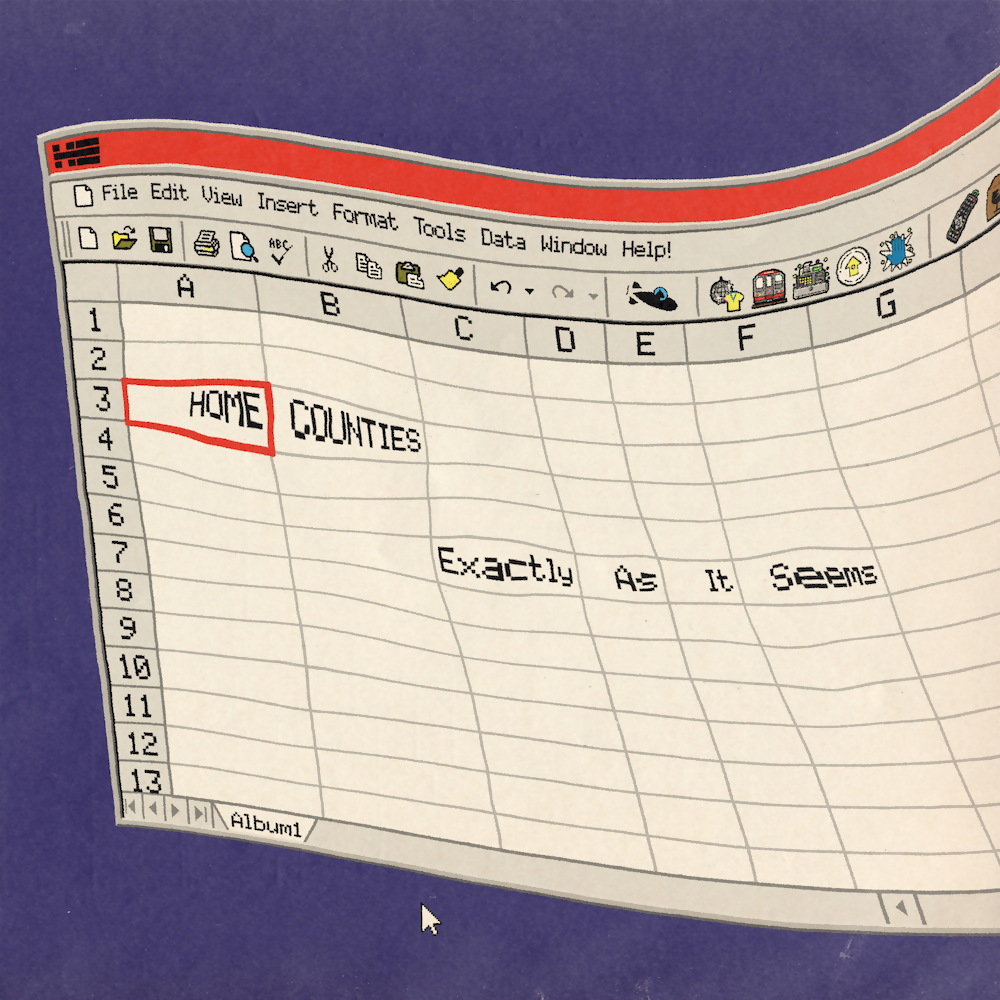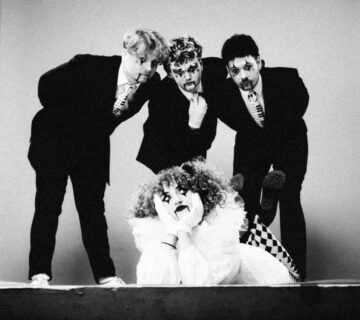
When disenchantment runs high, when city life isn’t all it’s cracked up to be — when you’re forking out seven quid for a pint, shivering in a queue for a club night you don’t really care about, getting ripped off by landlords over blu tac stains, and squeezing in studio sessions around a relentless 9-5 schedule, there is only one logical response: fun.
Produced in its entirety by the band’s guitarist, Conor Kearney, Exactly As It Seems was recorded in a small studio in Hackney, where they convened every evening after work for months on end. “All six of us crowded in like sardines,” vocalist and guitarist Will Harrison recalls.
The resulting body of work – mixed by the renowned Andy Savours (Black Country New Road, Róisín Murphy, The Kills) – dutifully captures the band’s rapturous live performances; a fizzing display of eclecticism all with a focus on melody in its purest form. Home Counties have always excelled at poking at life’s mundanities, but this time they supply the humdrum with some enormous pop hooks.
Thematically the album traverses the ups and downs of London life in your late twenties. “The album is about moving to London and the experiences of that,” notes Will. “It’s an album about despair at your current financial prospects, feeling guilty about your role in gentrification, being overwhelmed by consumer choice, and disintegrating friendships.”
With influences ranging from early 2000s pop to the nuanced art-rock of Talking Heads, this London-based six-piece brings a fresh, exploratory approach to their music. Join us on a journey through Home Counties’ highly anticipated debut album, Exactly As It Seems.

Uptight
‘Uptight’ started as a half-joking attempt to create a 00’s club banger. Despite regrettably failing at this mission, we tried to mimic the tropes of the era, dialling in the tackiest synth tones and Lois doing Britney-esque ad-libbing over the last chorus.
In opposition to the typical ‘dance all night’ mantra of 00s pop songs, I thought it would be funny if the song was about not wanting to go clubbing anymore. The lyrics largely moan about the petty annoyances you voice on a night out, like the extortionate price of pints or queuing for ages to get into a dive bar. It also discusses the worry that everyone thinks you’re boring or that you’ve grown old too quickly and how this feeds the cycle of repeatedly going out to places you hate. Saying that, I also see the song as a celebration of these shit places – of saying ‘fuck it, I’ll come out’ and ignoring the grumpy old man tendencies you have prematurely developed.
Bethnal Green
We were all immediately drawn to this song. The most collaboratively written Home Counties track to date, it’s also the first to include Lois on lead vocals. Hearing Lois’ voice on the track really expanded our idea of what Home Counties could and should be.
Lyrically based on the improvised words spontaneously sung by our drummer Dan over the original demo upon first hearing it, the song is about the experience of being an active participant in the gentrification of an area, and the conflicting feelings of guilt that come with trying to justify your presence there. In this way, the song was also important in opening a more self-reflective and introspective style of lyricism which has informed much of our upcoming debut album.
Funk U Up
The song began life as a demo from a few years ago, which was lyric-less but was always titled ‘Funk U Up’. When we came to look for songs to include on the album, we came back to this demo. There was a bit of a ‘this is really weird, but sure’ feeling initially, especially with trap hi-hats and the ridiculous screaming synth bass at the end, but it has since become one of our favourites to play live.
When it came to lyric writing, we had to maintain the title (which had become too ingrained to change) and find a topic which suited the chaotic and oppressive sound of the instrumentation. Aligning to this, ‘Funk U Up’ became about experiencing information overload and excessive consumer choice in contemporary society. It compares the feeling you have as a child, when you get lost in the supermarket, to the pressures of everyday young adult life, with the constant bombardment of social media and advertisements making you feel lost.
Dividing Lines
Originally titled ‘Cowbell’, the song was initially about the growing derivativeness of post-punk bands. However, during the pandemic, I became obsessed with the right to roam from walking a lot, and the meaning of the song sort of morphed into something bridging two seemingly separate themes.
‘Dividing Lines’ is about social exclusion, taking land ownership and the music industry as two examples. The song starts by talking about the injustice of private property in the country and the city, of normal people not being allowed to move freely where they wish. It asks, why should we be prohibited from visiting places which were only made private after theft hundreds of years ago? In this light, the choruses are a tongue-in-cheek call for reparation to landowners for this injustice.
The song then moves on to draw comparison between these exclusionary practices and those of the contemporary music industry, with its ingrained nepotism and cliquey-ness. In that light, the second chorus switches perspective to that of the industry, vetting you for your suitable entry into it. Underlying is the theme that informal arrangements, with ‘no contracts signed’ and following only what is customary, leads to the same dividing lines being repeated throughout society.
Push Comes to Shove
On one level, ‘Push Comes to Shove’ is a song about a difficult time in our friendship group and the breakdown of one relationship in particular. More fundamentally, the song is a reflection on how badly we deal with these situations emotionally. It’s dense in proverbs which are used to reflect a bigger point of not being able to talk about things, hiding what you feel under unhelpful levels of abstraction.
Out of all of the songs on the album, ’Push Comes to Shove’ was the hardest to get right. It’s got quite a different vibe to many of the album tracks, being more melancholy and lyrically personal, which made it feel like it didn’t fit as a Home Counties song. It went through so many diverse iterations over the album process, from 80s pop to stripped back indie, and we were never all happy. Eventually we returned to the original demo, and found that the album had sort of grown around it – it felt like it was now something that we could now do.
Wild Guess
Wild Guess is the oldest song on the new album. It voices a variety of concerns: day-to-day financial worries, fear of social isolation in old age, even a looming future of ecological collapse – it’s a fun one..
It was written as part of an experimental side project with former member and collaborator Sam Woodroffe, which never saw the light of day. In its original form it was like a deranged version of the Wii Sports loading screen, layered with a detuned Ed Miliband speech in replace of the vocals.
We revisited the song many times over the years but it never felt quite Home Counties. Over the last year, however, as our sound was shifting, we gave it one last go. It was an exercise in restraint, holding ourselves back to allow the song to breathe. That said, we couldn’t resist retaining some of the original chaos of the original demo, sticking in a drum and bass-inspired drop at the end. In that way, the song sets the new parameters of where Home Counties is at the moment…
You Break It, You Bought It
‘You Break it, You Bought It’, a staple of our set in recent years, was for a long time half-finished with only a few lyrics, mostly improvised each night by Barn about what we could see around the venue (usually, ‘the back of the bar’). The phrase ‘you break it, you bought it’ came from Barn’s response to Katy J Pearson’s request to borrow a guitar strap at Green Man in 2021. Deciding that this encounter and improvisation wouldn’t quite cut it, we worked backwards to write lyrics which matched the sentiment of the title.
Having lived for years in shoddy flats, and having recently moved to the extortionately priced area of East London, it’s about the state of renting and our growing animosity to landlords. It describes landlords’ refusal to improve conditions for their tenants and their eagerness to evict anyone endangering profit margins. In response, it encourages petty actions as if revolutionary behaviour: lose your keys, make blue tack stains, refuse coasters, don’t empty the toaster tray.
Cradle, Coffin
‘Cradle, Coffin’ was another of the earliest songs written when Lois joined the band, which we first played live at Lois’s live debut at Wilderness Festival in 2022. Like ‘Bethnal Green’, the writing revolved heavily around the skip-rescued Casio keyboard, which remains the main synth tone of the song. It also signalled the start of more production-focused experimentation with our guitars, cutting up the recordings and warping them in more creative ways, which we then used on a lot of other tracks.
The song voices worries about a lack of money in the present and projects it onto fear of your future, of having children and growing old without social care. It sort of sits in the Cameron-era austerity world, with the removal of any kind of state safety net and laments the loss of it, wishing for a return to the ‘cradle to grave’ postwar consensus.
Exactly as it Seems
‘Exactly as it Seems’ was one of the later additions to the album, but one that immediately became one of our favourites. Starting life as a rocky demo, Conor had gotten stuck on where to take it next. Conor asked me to help him work on it, which took the form of basically remixing it as a 00s pop song, removing all acoustic instrumentation. Suddenly something just clicked, and it all came together very quickly. Lyric-less, we sang a melody over the song using the lyrics of Slipknot’s ‘Psychosocial’, and the song was basically made.
The title ‘Exactly as it Seems’ originated from a song we wrote in our old band when we were 15, which was a lament on being bored by the repetition of small-town life and smoking lots of weed in the park. In a way, the current song describes a similar sort of feeling that carries on into your early 20s. Despite being somewhere more exciting like London, the reality of the repetition of monotonous office work creates a similar seemingly inescapable experience.
The main theme of the song is aspiring to feel aspirational – being surrounded by people brimming with optimism and drive about their careers and failing to feel the same. It’s about simultaneously wanting to break out into something more interesting but resenting the sort of people that do just that, like giving evils to successful people on the cover of magazines out of jealousy.
Posthumous Spreadsheets
‘Posthumous Spreadsheets’ is a sort of reflection on the themes of the whole album. It’s asking, given all of the aspects of life discussed in the other songs, what will my legacy be?
The first half of the song sees me daydreaming at work about history and my place within it. Obsessed by history, it talks about the issues of this nostalgia infecting all parts of life, and the loss of the youthful ambition to not end up in the adult world of monotony. Like ‘Exactly’, it also touches a lot on aspiration (and lack thereof) and trying to foster more of it within yourself, and wondering if you’ll get to a place where you’ll look back contently with your life. The title comes from the idea of being remembered only for your mundane office work as if your spreadsheets were suddenly discovered after you were dead and you were finally recognised for their greatness. Elsewhere, the song imagines another path – getting to the top of the ladder with a well-paid city job, only to retire only and reform the band in middle age.
The song ends with the sentiment that all of this worrying is a bit melodramatic and comes from a very middle class place of privilege. In the end, you’re going to keep going so stop worrying and complaining about it all, and enjoy it whilst it lasts. In that way, I think it’s a useful endnote to the album – fundamentally a collection of songs to dance to whilst you complain, or more kindly process life as it is.
Keep up to date with the best in UK music by following us on Instagram: @whynowworld and on Twitter/X: @whynowworld




